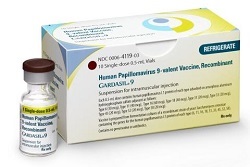Merck ($MRK), GlaxoSmithKline ($GSK) and public health officials in the United States have some big new numbers to tout to promote HPV vaccination.
On Monday, a group of federal researchers said that since the introduction of Gardasil in 2006, HPV infection rates in teenage girls have fallen by nearly two-thirds.
The Merck vaccine was first recommended in late 2006 in the U.S. For the new study, the investigators examined HPV prevalence between 2009 and 2012. The team found that during those years, HPV infection rates were 64% lower than they were prior to introduction for girls aged 14 to 19; the 20-to-24 age range saw a 34% drop.
Debbie Saslow, an American Cancer Society expert on HPV vaccination, told The New York Times "the vaccine is more effective than we thought." Teens who are vaccinated and become sexually active don't spread the virus, protecting even those who aren't vaccinated, Saslow added to the Times.
 Since their introduction, Merck's Gardasil and GSK's Cervarix have seen resistance to uptake due to factors such as a sex-related stigma, safety worries, misinformation and the fact that many doctors don't strongly recommend the shots. However, Monday's news may provide new energy in an HPV vaccination push.
Since their introduction, Merck's Gardasil and GSK's Cervarix have seen resistance to uptake due to factors such as a sex-related stigma, safety worries, misinformation and the fact that many doctors don't strongly recommend the shots. However, Monday's news may provide new energy in an HPV vaccination push.
On that front, earlier this month, 69 of the NCI's designated cancer centers joined together to urge vaccination following the release of lagging CDC vaccination rates for 2015. As part of the effort, many doctors are encouraging their peers to strongly recommend HPV vaccination along with other typical preteen shots, the NYT reports.
According to 2015 CDC numbers, just 40% of girls and 21% of boys in the U.S. have received the vaccines, compared with the goals of a HHS 2020 initiative seeking rates of 80% for both boys and girls.
Resistance to the vaccines has also led to sales lower than initial, optimistic peak expectations, which once ranged between $4 billion and $10 billion. Last year, Merck's Gardasil and Gardasil 9 franchise raked in $1.9 billion, 10% more than in 2014. GSK's Cervarix sales amounted to £88 million ($128 million), a 20% drop from 2014.
- here's the NYT story
- and the study abstract